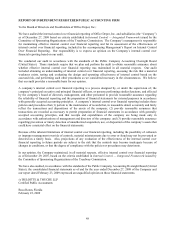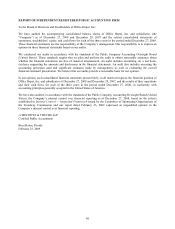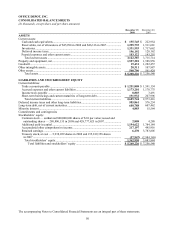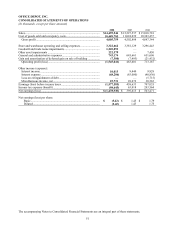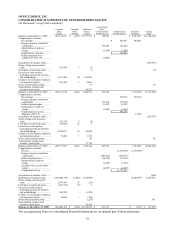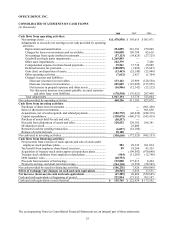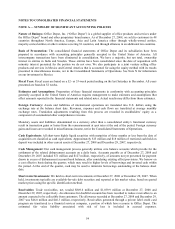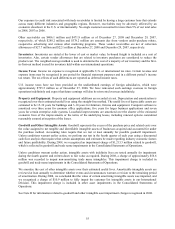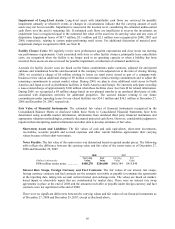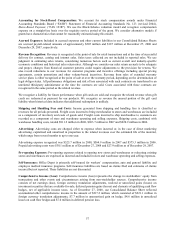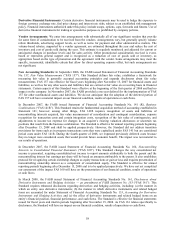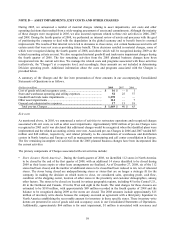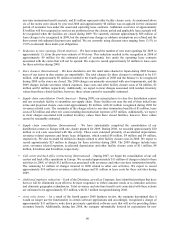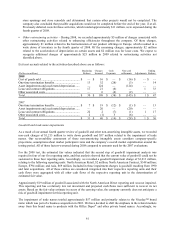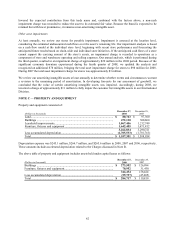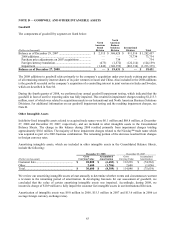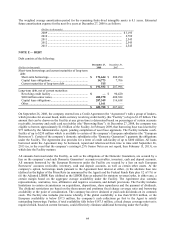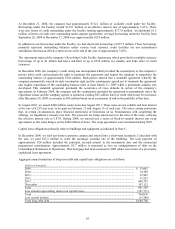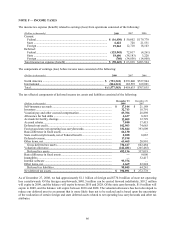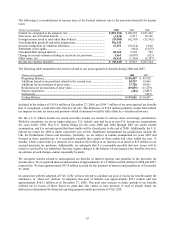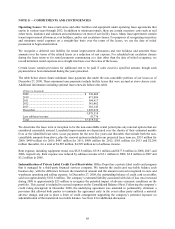Office Depot 2008 Annual Report Download - page 59
Download and view the complete annual report
Please find page 59 of the 2008 Office Depot annual report below. You can navigate through the pages in the report by either clicking on the pages listed below, or by using the keyword search tool below to find specific information within the annual report.58
Derivative Financial Instruments: Certain derivative financial instruments may be used to hedge the exposure to
foreign currency exchange rate, fuel price change and interest rate risks, subject to an established risk management
policy. Financial instruments authorized under this policy include swaps, options, caps, forwards and futures. Use of
derivative financial instruments for trading or speculative purposes is prohibited by company policies.
Vendor Arrangements: We enter into arrangements with substantially all of our significant vendors that provide
for some form of consideration to be received from the vendors. Arrangements vary, but generally specify volume
rebate thresholds, advertising support levels, as well as terms for payment and other administrative matters. The
volume-based rebates, supported by a vendor agreement, are estimated throughout the year and reduce the cost of
inventory and cost of goods sold during the year. This estimate is regularly monitored and adjusted for current or
anticipated changes in purchase levels and for sales activity. Other promotional consideration received is event-
based or represents general support and is recognized as a reduction of cost of goods sold or inventory, as
appropriate based on the type of promotion and the agreement with the vendor. Some arrangements may meet the
specific, incremental, identifiable criteria that allow for direct operating expense offset, but such arrangements are
not significant.
New Accounting Standards: In September 2006, the FASB issued Statement of Financial Accounting Standards
No. 157, Fair Value Measurements (“FAS 157”). This Standard defines fair value, establishes a framework for
measuring fair value in generally accepted accounting principles and expands disclosures about fair value
measurements. FAS 157 was effective for fiscal years beginning after November 15, 2007 for financial assets and
liabilities, as well as for any other assets and liabilities that are carried at fair value on a recurring basis in financial
statements. Certain aspects of this Standard were effective at the beginning of the first quarter of 2008 and had no
impact on the company. In November 2007, the FASB provided a one year deferral for the implementation of FAS
157 for other nonfinancial assets and liabilities. We do not anticipate that the adoption of the deferred portion of
FAS 157 will have a material impact on our financial condition, results of operations or cash flows.
In December 2007, the FASB issued Statement of Financial Accounting Standards No. 141 (R), Business
Combinations (“FAS 141R”). This Standard retains the fundamental acquisition method of accounting established in
Statement 141; however, among other things, FAS 141R requires recognition of assets and liabilities of
noncontrolling interests acquired, fair value measurement of consideration and contingent consideration, expense
recognition for transaction costs and certain integration costs, recognition of the fair value of contingencies, and
adjustments to income tax expense for changes in an acquirer’s existing valuation allowances or uncertain tax
positions that result from the business combination. The Standard is effective for annual reporting periods beginning
after December 15, 2008 and shall be applied prospectively. However, the Standard did not address transition
provisions for items such as in progress transactions costs that were capitalized under FAS 141 but are considered
period costs under FAS 141R. During the fourth quarter of 2008, we expensed previously deferred costs because
they no longer were considered assets that would provide future economic benefit. The impact was not material to
our results of operations.
In December 2007, the FASB issued Statement of Financial Accounting Standards No. 160, Noncontrolling
Interests in Consolidated Financial Statements (“FAS 160”). This Standard changes the way consolidated net
income is presented, requiring consolidated net income to report amounts attributable to both the parent and the
noncontrolling interest but earnings per share will be based on amounts attributable to the parent. It also establishes
protocol for recognizing certain ownership changes as equity transactions or gain or loss and requires presentation of
noncontrolling ownership interest as a component of consolidated equity. The Standard is effective for annual
reporting periods beginning after December 15, 2008 and is to be applied prospectively. We have not yet completed
our assessment of the impact FAS 160 will have on the presentation of our financial condition, results of operations
or cash flows.
In March 2008, the FASB issued Statement of Financial Accounting Standards No. 161, Disclosures about
Derivative Instruments and Hedging Activities — an amendment of FASB Statement No. 133 (“FAS 161”). This
Standard requires enhanced disclosures regarding derivatives and hedging activities, including: (a) the manner in
which an entity uses derivative instruments; (b) the manner in which derivative instruments and related hedged
items are accounted for under Statement of Financial Accounting Standards No. 133, Accounting for Derivative
Instruments and Hedging Activities; and (c) the effect of derivative instruments and related hedged items on an
entity’s financial position, financial performance, and cash flows. The Standard is effective for financial statements
issued for fiscal years and interim periods beginning after November 15, 2008. As FAS 161 relates specifically to
disclosures, the Standard will have no impact on our financial condition, results of operations or cash flows.


